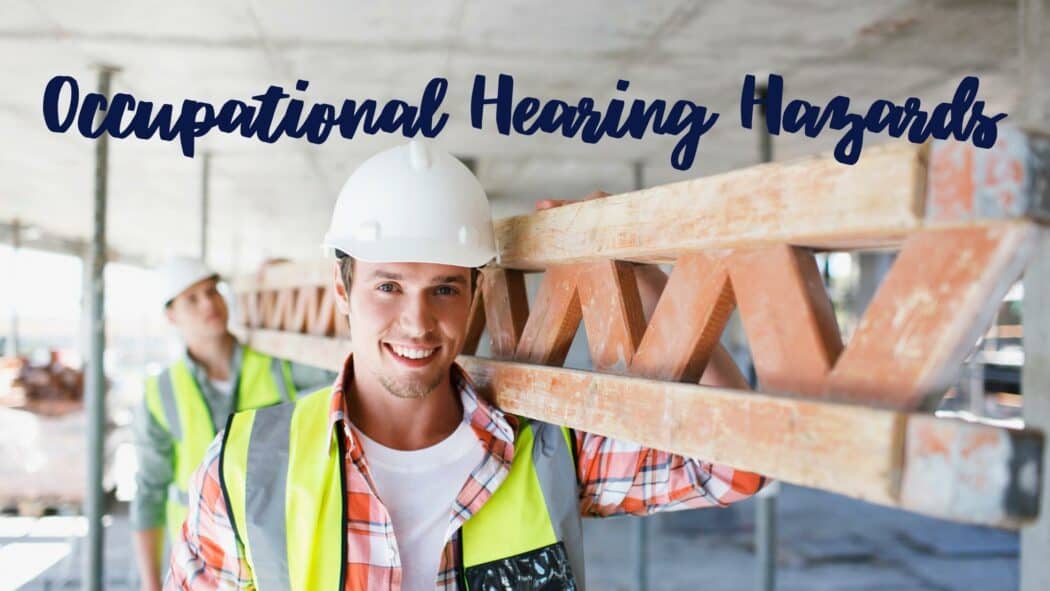Every day we are surrounded by sound. Sounds help us navigate the world around us, communicate with others and even have the potential to release pleasure in the brain. However, when sounds become too loud, it is considered noise. Noise is when sounds cause anxiety, stress, and are so loud that they can actually cause hearing loss.
Hearing Loss in the Workplace
According to the Centers for Disease Control and Prevention, an estimated 24% of hearing loss in the United States has been attributed to workplace exposure. Many jobs can expose you to noise such as construction work, in factories, those who work with airplanes, nightclubs or concert venues or are in the military. It’s important to understand your risk at work and how to protect yourself. Currently, Occupational Safety and Health Administration (OSHA) requires workplaces to offer hearing protection to their employees at no cost to them. Ultimately it is up to the worker to make sure to use the hearing protection and ensure it is worn correctly. In addition, OSHA has suggested that employers can protect their worker’s hearing by using quieter machines, isolating the noise source or limiting worker exposure. Taking precautions to avoid hearing damage can avoid a lot of problems later on.
How Loud is Too Loud?
Understanding when your hearing is at risk can help you protect your own hearing in a working environment. First of all, sound is measured in decibels (dB). A regular conversation between two or three people usually registers at around 60dB. Any sound that rises above 85 decibels will start to slowly damage your hearing. Loud sound damages tiny hair-like cells in the inner ear, called stereocilia. Stereocilia are responsible for transmitting sound from your ears to your brain where speech is understood, and sounds are processed. When these cells are damaged, this starts to cause hearing loss which is irreversible. It is not just the level of sound which can damage your ears, but the length of exposure.
The Length and Level of Exposure
For instance, if your job exposes you to 85dB for eight hours a day, five days a week, a significant hearing loss can develop over ten years. However, as the decibel level rises the amount of time that damage occurs lessens. If you work in a nightclub where the sounds reach on average 98 DB, the amount of damage can happen all too quickly. This is why veterans suffer such high rates of hearing loss. Currently there are 1.1 million Veterans who receive compensation for hearing loss. Exposure to loud machinery and explosions can cause hearing damage almost instantaneously.
Not Only Noise
While it is understood that noise puts your hearing at risk in the workplace this is not the only risk. Many people use chemicals or are exposed to them as part of their job. Some chemicals are considered ototoxic, meaning that they can damage your inner ear in a similar manner as noise. Some common ototoxic chemicals include solvents, metals, carbon monoxide, and specific pharmaceuticals. When mixed with loud noise, these chemicals make your ears even more susceptible to permanent damage. About 10 million people are exposed to solvents in the workplace.
Prevention of Ototoxic Chemicals
Employers are required to label and inform you of any chemicals you use on the job that can be considered ototoxic. Make sure you do your research and access this information. You can urge your employer to replace hazardous chemicals with less toxic chemicals when possible. If this is not an option, insist on isolating the use of these chemicals to controlled environments, where there is less chance of exposure. It is also helpful to ensure the area where the chemicals are used is properly ventilated to avoid long term effects to hearing.
Take Control of Your Hearing Health!
While there are protections for your hearing in the workplace, it is up to you to make sure you take advantage of them. Hearing loss due to noise or chemical exposure is almost always permanent, so don’t wait for your employer to protect your ears. If you have found that you have been exposed to hearing damage in the workplace, it is important to seek treatment as soon as possible. The most common treatment for hearing loss is hearing aids, which amplify the sounds you struggle with. Working with hearing aids can help you stay alert at work and be able to communicate clearly. Call today to schedule an appointment for a hearing test!

